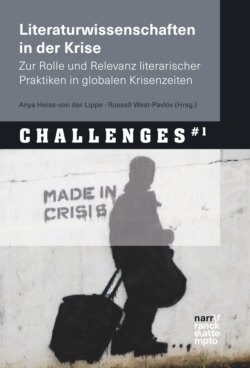Читать книгу Literaturwissenschaften in der Krise - Группа авторов - Страница 10
Literatur
ОглавлениеAlford, Ryan (2017). Permanent State of Emergency: Unchecked Executive Power and the Demise of the Rule of Law. Montreal: McGill Queen’s University Press.
Amnesty (2017). Amnesty International Report 2016/2017: The State of the World’s Human Rights. London: Amnesty International.
Avent, Ryan (2017). The Wealth of Humans: Work and its Abuses in the Twenty-First Century. London: Penguin.
Bales, Kevin (2012). Disposable People: New Slavery in the Global Economy. 2nd ed. Berkeley: University of California Press.
Blom, Philipp (2017). Was auf dem Spiel steht. München: Hanser.
Cameron, Nigel M. de S. (2017). Will Robots Take Your Job? A Plea for Consensus. Cambridge: Polity.
Colebrook, Claire (2014). Death of the PostHuman. Ann Arbor: Open Humanities Press.
Doerry, Martin (2017). ›Germanistik-Studium: Wer war Goethe? Keine Ahnung, irgendso’n Toter.‹ Der Spiegel (6. Februar) http://www.spiegel.de/spiegel/germanistik-studium-wo-die-chancen-fuer-germanistik-studenten-liegen-a-1133069.html
Drügh, Heinz, Susanne Komfort-Hein und Albrecht Koschorke (2017). ›Krise der Germanistik?: Wir Todgeweihten grüßen euch!‹ Frankfurter Allgemeine Zeitung Feuilleton (9. Februar). http://www.faz.net/aktuell/feuilleton/debatten/krise-der-germanistik-antwort-von-heinz-druegh-susanne-komfort-hein-und-albrecht-koschorke-14868192.html (31.10.2017).
Fassin, Didier (2016). ›Short Cuts‹, London Review of Books 38:5 (3. März), 23.
Frey, Carl Benedikt and Michael A. Osborne (2013). The Future of Employment: How Susceptible are Jobs to Computerisation? Working Paper. Oxford Martin Programme on Technology and Employment. http://www.oxfordmartin.ox.ac.uk/downloads/academic/future-of-employment.pdf (31.10.2017).
Friedman, Thomas L. (2016). Thank You for Being Late: An Optimist’s Guide to Thriving in an Age of Accelerations. London: Allen Lane.
Friedrich, Tobias, Axel Timmermann, Michelle Tichelaar, Oliver Elison Timm, Andrey Ganopolski (2016). ›Nonlinear climate sensitivity and its implications for future greenhouse warming.‹ Sci. Adv. 2016; 2: e1501923 (9. November 2016).
Kastberger, Klaus (2017). ›Schluss mit dem Totentanz-Geraune.‹ DIE ZEIT (13. Februar). http://www.zeit.de/kultur/literatur/2017–02/germanistik-literatur-deutsche-sprache-krise
Kurlantzick, Joshua (2013). Democracy in Retreat: The Revolt of the Middle Class and the Worldwide Decline of Representative Government. New Haven: Yale University Press.
Lenton, Timothy M., Hermann Held, Elmar Kriegler, Jim W. Hall, Wolfgang Lucht, Stefan Rahmstorf, and Hans Joachim Schellnhuber (2016). ›Tipping elements in the Earth’s climate system.‹ PNAS 105:6, 1786–93.
Leschke, Rainer (2013). ›Medientheorie und Krise‹, in: Uta Fenske, Walburga Hülk und Gregor Schuhen (Hrsg.). Die Krise als Erzählung – Transdisziplinäre Perspektiven auf ein Narrativ der Moderne. Bielefeld: transcript. 19–32.
Lüscher, Jonas (2013). Frühling der Barbaren. München: C.H. Beck.
Mantz, Jeffrey W. (2013). ›On the frontlines of the zombie war in the Congo: Digital technology, the trade in conflict minerals and zombification‹, in: Marina Levina und Diem-My T. Bui (Hrsg.). Monster Culture in the 21st century. London: Bloomsbury. 177–182.
Martus, Steffen (2017). ›Der eierlegende Wollmilchgermanist wird dringend gesucht.‹ Frankfurter Allgemeine Zeitung Feuilleton (8. Februar). http://www.faz.net/aktuell/feuilleton/forschung-und-lehre/germanistik-in-der-krise-der-eierlegende-wollmilchgermanist-wird-dringend-gesucht-14865806.html (31.10.17)
Mbembe, Achille (2012a). ›At the centre of the knot.‹ Social Dynamics: A Journal of African Studies, 38:1, 8–14.
Mbembe, Achille (2012b). ›Rule of property versus rule of the poor?‹, Mail & Guardian online (15 June). http://mg.co.za/article/2012-06-15-rule-of-property-versus-rule-of-the-poor (31.10.2017).
Mbembe, Achille (2016) Politiques de l’inimité. Paris: La Découverte.
Milanovic, Branko (2016). Global Inequality: A New Approach for the Age of Globalization. Cambridge MA: Belknap Press of Harvard University Press.
Nealon, Jeffrey T. (2016). Plant Theory: Biopower and Vegetable Life. Stanford: Stanford University Press.
Piketty, Thomas (2014). Capital in the Twenty-first Century. Trans. Arthur Goldhammer. Cambridge MA: Belknap Press of Harvard University Press.
Richards, James (2017). The Road to Ruin: The Global Elites’ Secret Plan for the Next Financial Crisis. London: Penguin Portfolio.
Sassen, Saskia (2014). Expulsions: Brutality and Complexity in the Global Economy. Cambridge MA: Belknap Press of Harvard University Press.
Scheffers, Brett R., Luc De Meester, Tom C.L. Bridge, Ary A. Hoffmann, John M. Pandolfi, Richard T. Corlett, Stuart H.M. Butchart, Paul Pearce-Kelly, Kit M. Kovacs, David Dudgeon, Michela Pacifici, Carlo Rondinini, Wendy B. Foden, Tara G. Martin, Camilo Mora, David Bickford, James E.M. Watson (2016). ›The broad footprint of climate change from genes to biomes to people.‹ Science 354: 6313 (11. November) [doi: 10.1126/science.aaf7671].
Streeck, Wolfgang (2014). Buying Time: The Delayed Crisis of Democratic Capitalism. London: Verso.
Toon, Brian, Alan Robock and Rich Turco (2008). ›Environmental consequences of nuclear war.‹ Physics Today 61: 12, 37. http://physicstoday.scitation.org/doi/10.1063/1.3047679 (31.10.2017).
UNCHR (2016). ›UNCHR Global Trends Report: Forced Displacement in 2016‹. Geneva: UNCHR. http://www.unhcr.org/5943e8a34 (31.10.2017).
UNDESA (United Nations Department of Economic and Social Affairs) (2013). International Migration Report 2013. New York: United Nations.
Waal, Alex de (2017) ›The Nazis Used It, We Use It: The Return of Famine as a Weapon of War.‹ London Review of Books 39: 12 (15 June), 9–12.
Wennersten, John R., and Denise Robbins (2017). Rising Tides: Climate Refugees in the Twenty-First Century. Bloomington: Indiana University Press.
Wickramasekera, Piyasiri (2011). ›International Labour Migration: The Missing Link in Globalization‹, DOSSIER Transnationalismus und Migration (1 May), 78–92.
Žižek, Slavoj (2016). ›A Marxist for Trump: Far Left Philosopher Slavoj Žižek Explains Why He Supported Trump over Clinton‹, Vice News (30. November). https://news.vice.com/story/far-left-philosopher-slavoj-zizek-explains-why-he-suppored-trump-over-clinton (31.10.2017).
